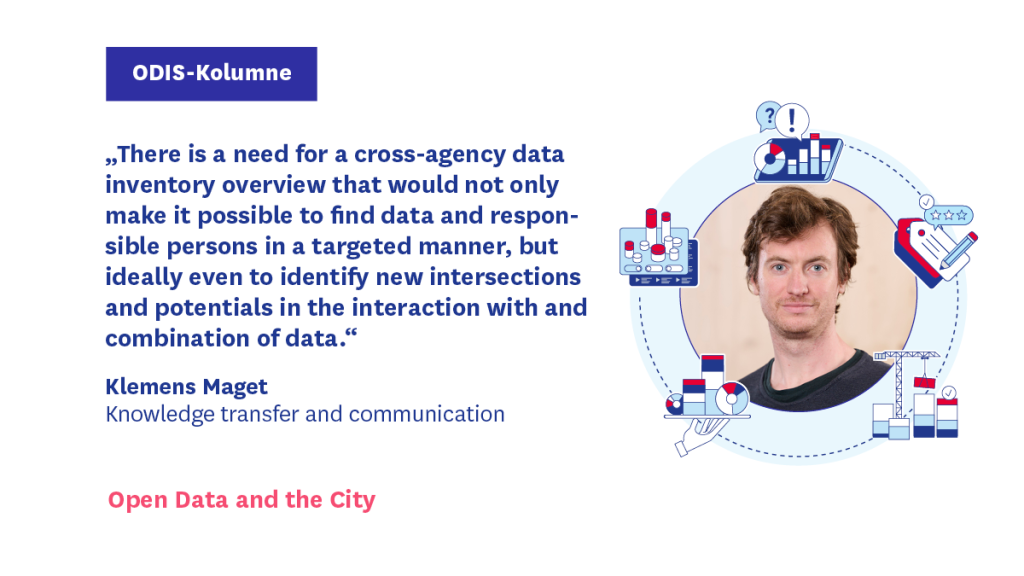Since 2018, the Open Data Informationsstelle Berlin (ODIS) has been accompanying our city on its way to an open, sustainable and data-driven society. The focus is on the provision and use of open data. In our column, one team member reports on their work experiences based on the stages of the Open Data Journey and provides an exciting insight into their projects – including a few stories from the sewing box!

What is typically Berlin? 100 data sets know the answer
You might think that after many years in Berlin, nothing can surprise you anymore. But Berlin proves the opposite again and again. My bike cellar was emptied for the second time this year – is that just me? The bus is late – wasn’t it more punctual in the past? And on the way home, I get into a demo between Kotti and Hermannplatz. If only I had known that!
But what do we really know about our city? What information is particularly relevant to us? My predecessors thought about this almost three years ago as part of their work at the Open Data Informationsstelle (ODIS). The publication “Berlin’s Core Data Records” resulted in a list of 100 particularly valuable data sets, which were developed in dialogue with various representatives of urban society and identified as particularly valuable for Berlin’s citizens. These include information on bicycle thefts and demonstration routes, but also on topics such as the development of the rent index, the provision of free Wi-Fi or the availability of sports facilities for clubs.
In November 2023, the concept of core datasets was included in the Berlin Open Data Strategy – and this year it became my task to identify the respective bodies responsible for these datasets and to initiate their publication. Sounds easy? It wasn’t quite that simple!
As an ODIS data detective on the hunt for the data treasures of the administration
When searching for the core data sets, one challenge became particularly clear to me: Most Berlin authorities do not have a clear overview of where which data is stored and who is responsible for it.
For some topics, it may seem obvious which authority is responsible, but it is often a lengthy process to first find the right department, then the right department and finally the data-holding office or the right contact person.
An example: Where are defibrillators located in public spaces? Does this information lie with the health administration? Or in the interior administration? After several phone calls and e-mails, it turned out that the Berlin fire department has 475 defibrillator locations in its operations control system – but there is a lack of exact data on the locations in public buildings. At least I now knew that I had to start with the fire brigade for this data set.
Data management is not a pure open data topic, but above all helps the administration itself
An immense amount of data is collected in the 12 district administrations, 10 senate administrations and numerous downstream authorities of the Berlin administration, which is crucial for reports, reports and the strategic management of the city. Without central data management, it quickly becomes confusing. My requests to identify the core data sets may be unusual for the administration, but requests for information “from outside” are actually the rule. Every day, press inquiries or parliamentary inquiries are made to the authorities and often have the highest urgency. With over 100,000 employees and a large number of specialist procedures and data sets, identifying contact persons for these inquiries can be a time-consuming tour de force – and the happy ending is only certain if the person you are looking for is not on vacation.
Knowledge transfer is often based on routines and empirical values that have been built up over years. But what happens to this informal knowledge when, according to estimates by the Senate Department for Finance, around 30 percent of employees will retire by 2031? Many of the contact persons will be eliminated, and there is a risk that important information will be lost.
Even if contact persons are found, it is not always guaranteed that all relevant information will be disclosed. Another example: A written inquiry on the status of the expansion of solar systems in schools was answered by the Senate Department for Economics – although the education administration could have provided much more detailed information.
The vision: A central data catalog for the administration
At ODIS, we are also often asked whether data is available on certain topics. This year, an employee of the administration contacted us who wanted to find out which offices keep data on refugees. She wanted to use it to develop new political control indicators. However, we could not give her a clear answer. Although there is a few open information on the topic of refugees in the Open Data Portal, internal data? These could be available in various offices: district offices, the State Office for Immigration (LEA), the State Office for Refugee Affairs (LAF) or in the Senate Administrations for Education, Health or Social Affairs. But who has what information?
So if we look at the current challenges and the challenges to be expected from demographic change and at the demands of a modern, data-driven administration, it is becoming increasingly clear that there is a need for a cross-agency data inventory overview that would not only make it possible to find data and responsible persons in a targeted manner, but ideally even to identify new intersections and potentials in the interaction with and combination of data. This could come in the form of an internal administrative metadata catalog that could be searched and filtered for keywords.

The hunt for Berlin’s core data sets continues
Unfortunately, we are not that far in Berlin yet. So my search for the core data sets remains detective work for the time being. Fortunately, I have important allies in this: Open Data Officers are active in almost every authority and have been getting an overview of the data jungle for years. With their support, we have already been able to identify numerous core data sets and free them from their silos as open data.
I’m not the only one who is happy about it – our ODIS mascot, Odi, is also enthusiastic. Odi, our informant for open data, regularly picks open core data sets and creates small statistics and data analyses. For example, I found out that I actually live in one of Berlin’s bike theft hotspots!
Stay tuned – we’ll continue next month!
By the way, the next ODIS column comes from our data virtuoso Max, who is dedicated to the exciting topic of “preparing data”. Stay tuned and read more next month!
